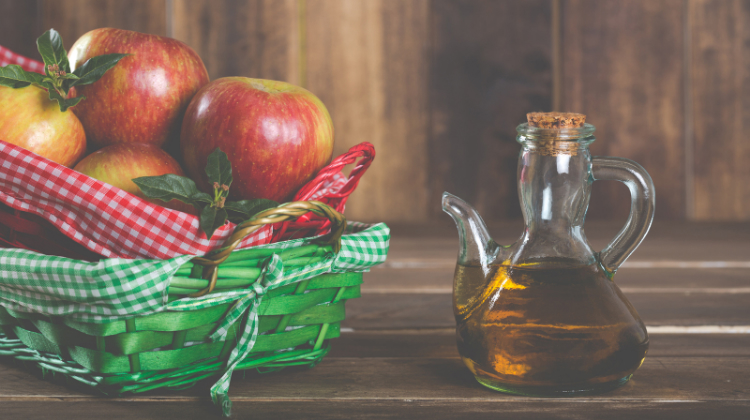 Expert's opinion
Expert's opinion
Expert's opinion
The article is a subjective view on this topic written by writers specializing in medical writing.
It may reflect on a personal journey surrounding struggles with an illness or medical condition, involve product comparisons, diet considerations, or other health-related opinions.
Although the view is entirely that of the writer, it is based on academic experiences and scientific research they have conducted; it is fact-checked by a team of degreed medical experts, and validated by sources attached to the article.
The numbers in parenthesis (1,2,3) will take you to clickable links to related scientific papers.
Can Apple Cider Vinegar Treat Kidney Stones? Here’s How It Works 2024

Nephrolithiasis[1], known as kidney stones, is formed when urine has higher mineral levels than usual. The pH level of urine and concentration of excess substances such as uric acid, calcium, phosphorus, oxalate, and cystine can cause kidney stones. Thus, kidney stones can be prevented if the excess concentration of these substances is avoided.
Kidney stones are the most common condition of the urinary tract system affecting 12% of the world population. Although modern medicine has a lot to offer to treat kidney stone formation and pain management, people commonly seek alternative medicine and home remedies to heal. Apple cider vinegar (ACV) for kidney stones has become one of the most popular home remedies. In this article, you’ll learn if apple cider vinegar helps kidney stone treatment.
Does Apple Cider Vinegar Help Dissolve Kidney Stones?
Kidney stones can be chronic and painful. That’s why people seek alternative ways of treatment that are easy to monitor. So maybe you too wonder what dissolves kidney stones fast. First, let’s learn how kidney stones are formed to answer that question.
Formation of Kidney Stones
Acid-base balance[2] is tightly regulated in our bodies. Because changes in the normal pH range can disturb physiological pathways since pH-dependent enzymes and some proteins may not work as they should. However, systemic or local acid-base balances are sometimes changed with drugs to treat diseases such as metabolic acidosis, epilepsy, constipation, etc.
In the case of kidney health, urinary pH can affect the formation of kidney stones. If urine pH is high, calcium oxalate or calcium phosphate crystals can be formed. If urine pH is low, uric acid crystallization may occur.
Certain food ingredients can make the urine more alkaline or more acidic. For example, citrate is found in foods such as lemon, grapefruit, orange, and pineapple juice. Higher citrate levels and low pH in urine may prevent calcium precipitates from leading to kidney stones.
Apple cider vinegar, a home remedy, is one of the foods thought to prevent kidney stones by increasing urinary citrate excretion and decreasing urinary calcium excretion.
The Science Behind Apple Cider Vinegar In Treating Kidney Stones
A study[3] assessed complementary and alternative medicine use in patients with kidney stones. Patients were asked to report dietary changes and other relevant interventions they made after getting a kidney stone diagnosis. Participants mostly used various kinds of lemon juice, cranberry juice, and apple cider vinegar-based products.
Researchers analyzed the alkali concentration and pH of the products mentioned above. It was concluded that apple cider vinegar has low alkalizing potential because of its acetic acid content. It would be even less alkaline when diluted before consumption; that’s why it may not be effective in preventing kidney stones.
Apple cider vinegar is made by fermenting pulverized apples using yeast and bacteria. Yeast converts sugar to alcohol, then alcohol to acetic acid[4], the main ingredient of apple cider vinegar. Another study[5] evaluated vinegar and acetate effects on kidney stone formation in animal models and humans. Both vinegar and 5% acetate increased urinary citrate excretion and decreased urinary calcium excretion in a rat model. Also, 24-hour urine was collected from 61 participants without kidney stones who consumed 15 ml or more mature vinegar daily. Patients taking vinegar had a higher urine pH and urinary citrate excretion. In contrast, they had lower urinary calcium and uric acid excretion.
In a cross-sectional study[6] done in China, almost a thousand people were screened for kidney stones, and their food intake was questioned. Results showed that increased meat consumption was associated with greater risk. In contrast, diets with higher tea, legumes, and fermented vinegar consumption were associated with a lesser risk of kidney stone formation.
How to Dissolve Kidney Stones with Apple Cider Vinegar?
Although there are some studies done on animal models, human kidney cells, and humans. There is no strong scientific evidence to support the effectiveness of apple cider vinegar in dissolving kidney stones.
First, we need to know how much apple cider vinegar for kidney stones treatment is required, and second how to take apple cider vinegar for kidney stones. As food or supplement, and for how long?
When relevant questions are answered, the effectiveness of apple cider vinegar for kidney stones can be determined. In the meantime, you can try scientifically established home remedies to prevent stone formation.
Other Home Remedies for Kidney Stones
Although there are no magical home remedies that treat kidney stones easily, there are things you can do to decrease the risk factors. According to the National Institute of Diabetes and Digestive and Kidney Diseases[7] (NIDDK), changes in nutrition could be helpful for preventing kidney stones naturally:
Drinking enough water is the most important thing you should do to prevent kidney stones. Drinking 6 to 8 glasses of water (48-64 ounces) is advised unless you have some disease such as kidney failure.
Certain healthy diets, such as the DASH[8] diet, may reduce the risk of kidney stones. DASH is a healthy diet regimen to improve and prevent hypertension. In this diet, you are advised to eat vegetables, fruits, beans, whole grains, nuts, fat-free or low-fat dairy, fish, and poultry; and limit high-fat meats, whole-fat dairy, sugary and acidic beverages, sweets, and sodium.
Citrate is found in foods such as lemon, grapefruit, orange, and pineapple juice. Drinking lemon juice may slightly[9] raise urinary citrate levels and lower urine pH.
Weight loss could be helpful for overweight people because having higher body weights than normal may increase the risk for kidney stones. Eating a healthy diet and maintaining a healthy body weight can help prevent kidney stones.
A healthy diet with certain food restrictions may prevent kidney stones. If you have existing stones, ask your doctor what type of kidney stones you have. Because food choices will differ to prevent the different types of kidney stones. So you would be able to have more food freedom.
What you should eat if you have:
Calcium oxalate stones and Calcium phosphate stones
- Reduce foods that are high in oxalate: Reduce nuts, peanuts, rhubarb, spinach, wheat bran, and other high oxalate foods to prevent calcium oxalate stones.
- Eat less sodium: Eating more sodium may increase kidney stone formation. Sodium is found in salt and many packaged and fast foods.
- Limit animal protein: While reducing animal protein such as beef, chicken, fish, and dairy products, ensure you’re getting protein from plant-based protein sources such as legumes, beans, lentils, plant-based milk products, and so on.
- Make sure you get enough calcium: The right amount of calcium intake does not cause calcium stone formation; in fact, it can block other substances causing kidney stones. Try to get calcium from plant-based foods and consult a health care professional to learn how much calcium you need to prevent getting calcium stones.
Uric acid stones
Limiting animal protein and losing weight if you’re overweight can show positive effects on kidney stones.
Cystine stones
Drinking enough liquid, mostly water, and reducing sodium intake can help. In a healthy diet, sodium intake is advised to be lower than 2300 mg daily, equivalent to sodium found in 2.3 mg of table salt.
Potential Side Effects & Precautions
There aren’t many studies evaluating apple cider vinegar’s health benefits and potential side effects on kidneys and kidney stones. However, apple cider vinegar’s effects on blood sugar and cholesterol levels were studied. A meta-analysis[10] of 9 studies assessed apple cider vinegar’s effects on blood lipid and glycemic parameters. Only two studies reported side effects of apple cider vinegar. Side effects were reported as stomach burning and apple cider vinegar intolerance.
Also, consuming larger quantities[4] and topical application on the skin[11] may result in side effects. Although serious side effects are rare, a case study[12] reported a 28-year-old woman having hypokalaemia, hyperreninemia, and osteoporosis after consuming 250 mL of apple cider vinegar daily for 6 years. Moreover, the high acidity of undiluted ACV may tear down tooth enamel.
Final Thought
There is no strong evidence showing the effectiveness of apple cider vinegar in treating kidney stones in humans.
Apple cider vinegar can cause side effects in some people, especially when consumed in high quantities for the long term.
Drinking enough water should be number one on the list to prevent kidney stones.
Dietary changes made based on the type of kidney stone may prevent and lower the risk of having kidney stones.
+ 12 sources
Health Canal avoids using tertiary references. We have strict sourcing guidelines and rely on peer-reviewed studies, academic researches from medical associations and institutions. To ensure the accuracy of articles in Health Canal, you can read more about the editorial process here
- Nojaba, L. and Guzman, N. (2021). Nephrolithiasis. [online] Nih.gov. Available at: https://www.ncbi.nlm.nih.gov/books/NBK559227/
- Quade, B.N., Parker, M.D. and Occhipinti, R. (2021). The therapeutic importance of acid-base balance. Biochemical Pharmacology, [online] 183, p.114278. doi:10.1016/j.bcp.2020.114278.
- Joshi, A., Tallman, J.E., Calvert, J.K., Brewer, T., Miller, N.L., Yang, L., Asplin, J.R. and Hsi, R.S. (2021). Complementary and Alternative Medicine Use in First-time and Recurrent Kidney Stone Formers. Urology, [online] 156, pp.58–64. doi:10.1016/j.urology.2021.05.084.
- Martini, N. (2021). Potion or Poison? Apple cider vinegar. Journal of Primary Health Care, [online] 13(2), p.191. doi:10.1071/hc19561.
- Zhu, W., Liu, Y., Lan, Y., Li, X., Luo, L., Duan, X., Lei, M., Liu, G., Yang, Z., Mai, X., Sun, Y., Wang, L., Lu, S., Ou, L., Wu, W., Mai, Z., Zhong, D., Cai, C., Zhao, Z. and Zhong, W. (2019). Dietary vinegar prevents kidney stone recurrence via epigenetic regulations. EBioMedicine, [online] 45, pp.231–250. doi:10.1016/j.ebiom.2019.06.004.
- Zeng, G., Mai, Z., Xia, S., Wang, Z., Zhang, K., Wang, L., Long, Y., Ma, J., Li, Y., Wan, S.P., Wu, W., Liu, Y., Cui, Z., Zhao, Z., Qin, J., Zeng, T., Liu, Y., Duan, X., Mai, X. and Yang, Z. (2017). Prevalence of kidney stones in China: an ultrasonography based cross-sectional study. BJU International, [online] 120(1), pp.109–116. doi:10.1111/bju.13828.
- and, D. (2022). Eating, Diet, & Nutrition for Kidney Stones. [online] National Institute of Diabetes and Digestive and Kidney Diseases. Available at: https://www.niddk.nih.gov/health-information/urologic-diseases/kidney-stones/eating-diet-nutrition#:~:text=Drinking%20enough%20liquid%2C%20mainly%20water,much%20liquid%20you%20should%20drink
- Nih.gov. (2021). DASH Eating Plan | NHLBI, NIH. [online] Available at: https://www.nhlbi.nih.gov/education/dash-eating-plan
- Penniston, K.L., Steele, T.H. and Nakada, S.Y. (2007). Lemonade Therapy Increases Urinary Citrate and Urine Volumes in Patients with Recurrent Calcium Oxalate Stone Formation. Urology, [online] 70(5), pp.856–860. doi:10.1016/j.urology.2007.06.1115.
- Hadi, A., Pourmasoumi, M., Najafgholizadeh, A., Clark, C.C.T. and Esmaillzadeh, A. (2021). The effect of apple cider vinegar on lipid profiles and glycemic parameters: a systematic review and meta-analysis of randomized clinical trials. BMC Complementary Medicine and Therapies, [online] 21(1). doi:10.1186/s12906-021-03351-w.
- Luu, L.A., Flowers, R.H., Kellams, A.L., Zeichner, S., Preston, D.C., Zlotoff, B.J. and Wisniewski, J.A. (2019). Apple cider vinegar soaks [0.5%] as a treatment for atopic dermatitis do not improve skin barrier integrity. Pediatric Dermatology, [online] 36(5), pp.634–639. doi:10.1111/pde.13888.
- Lhotta, K., Höfle, G., Gasser, R. and Finkenstedt, G. (1998). Hypokalemia, Hyperreninemia and Osteoporosis in a Patient Ingesting Large Amounts of Cider Vinegar. Nephron, [online] 80(2), pp.242–243. doi:10.1159/000045180.



